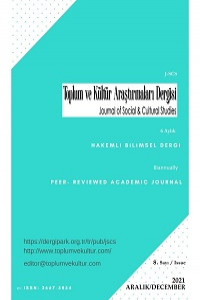Abstract
A House for Mr Biswas, Bay Biswas’ın hayat boyu mücadelesinin trajikomik bir hikâyesidir. Eser, Naipaul’un babasının başarıları ve kararları çerçevesinde oluşturulmuş bir aile biyografisidir. Kaynağını Naipaul’u edebi kariyerinde onu etkileyen babasından almaktadır. Çalışmada ele alınan soru ise babasının Naipaul’un edebi kariyerinde nasıl kendini gösterdiğidir. Cevap yazarın duruşunda gizlidir. Eserlerinin birçoğunda, babasının başarısızlıklarına gönderme yaparak ailedeki baba imgesini baltalamaktadır. Çarpıcı nokta ise her ne kadar Naipaul babasını bazı eserlerinde kötü yansıtsa da babasına çok şey borçludur. Bu borçluluğu, yazar edebi hayatının ilk ürünlerinden olan kitaplarında işlemiştir. Babasının kişisel hikâyesini ilk eserlerinde konu olarak kullanmıştır. İlk olarak babası tarafından eğitilen yazar, yaşamında büyük bir edebi başarıya ulaşmıştır ve bu sebeple bu çalışmanın amacı Naipaul’un babasını onun edebi ilham perisi olarak işaret etmektir. Tüm bu söylemler ise daha yeni çalışılmaya başlanan baba- oğul ilişkilerinin akademik tartışmaları ile de çerçevelendirilecektir.
References
- Bates, David. (1963). “Portrait Gallery: V. S. Naipaul,” Sunday Times Supplement, May 26, pp. 12-13 Bingham, Nigel. (1972). “The Novelist V. S. Naipaul Talks to Nigel Bingham about his Childhood in Trinidad,” Listener, 88, September 7, pp. 306-7.
Abstract
A House for Mr Biswas is the tragicomic tale of a lifetime struggle of Mr Biswas. It deals with the biography of V.S. Naipaul’s family constructed around his father’s failures and decisions. It has its source from Naipaul’s father influencing him deeply in his literary career. The question in general here is how Naipaul’s father shows itself in his literary career. The answer lies in the literary stance of Naipaul. In most of his works, he undermines the father image in a family by referring to the failures of his father. However, the striking point is that no matter how badly Naipaul represents fathers in his works he owes much to his father. In order to show his gratitude towards his father, he revisits the story of his father in the early works of his writing career. He uses his father’s personal history as his material, especially for his first books. Being educated firstly by his father, he achieves great literary success in his life and therefore, this paper aims to address Naipaul’s father as his literary muse. To support the claim of the constructive influence of fathers on their sons, the studies of newly emerged theories on the father-son relationship will be used as the theoretical frame.
Keywords
References
- Bates, David. (1963). “Portrait Gallery: V. S. Naipaul,” Sunday Times Supplement, May 26, pp. 12-13 Bingham, Nigel. (1972). “The Novelist V. S. Naipaul Talks to Nigel Bingham about his Childhood in Trinidad,” Listener, 88, September 7, pp. 306-7.
Details
| Primary Language | English |
|---|---|
| Journal Section | Research Articles |
| Authors | |
| Early Pub Date | January 10, 2022 |
| Publication Date | December 31, 2021 |
| Submission Date | November 16, 2021 |
| Published in Issue | Year 2021 Issue: 8 |
“Journal of Social and Cultural Studies” (J-SCS) is published in Turkish and English. “Journal of Social and Cultural Studies” (J-SCS) is published only in electronic form through its website and adopts open access policy. The journal is published twice a year, in June and December. No fees are charged for publications, no fees are paid to the editors, the editorial board and the referees and their owners. It is accepted that the authors who submit articles to the contact address for publication in the journal should read and acknowledge this copyright statement.
“Journal of Social and Cultural Studies” is open to the work of all researchers who have the title “PhD” or “PhD student”. It is not obligatory that the second, third and fourth authors of the article have the title “PhD” or “PhD student”. An article should has been written by max. four authors. The articles prepared in accordance with the writing rules are presented to the referee for review after they have passed the editorial review. The reviewer may ask for a correction to the article, directly refuse or accept it. For the articles declined as a result of the reviewer evaluation, a second reviewer may be requested by the author, If the editors’ board finds that the request is appropriate, the article will be sent to a second reviewer.
The articles previously published in another publication or in the evaluation stage by another publication are not accepted into “Journal of Social and Cultural Studies” publication process. All the ethical and legal responsibilities related to the published articles belong to the authors.


